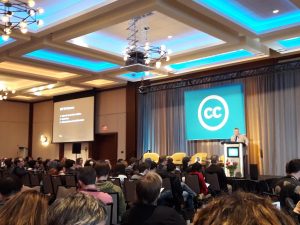
Reflection of CN Tower, Toronto (Photo: IFLA CC-BY 4.0)
The Internet itself, at its inception, was designed to be open. The movements that have been built on top of it – Wikipedia, Mozilla, and of course Creative Commons – have championed openness as a means of improving the world and delivering the potential of the Internet to break down walls, bridge divides, and tackle inequity.
This is a struggle that libraries have long engaged in, more or less explicitly, more or less radically, through providing access to information for all. However, Day 2 of the summit illustrated that the growth of the ‘open’ movement is not necessarily inevitable. Two particular challenges stood out.
A first lies in the desire to retain rights in the hope of making financial gain. At a session looking at Creative Commons in developing countries, speakers from across Africa underlined that for people living on very little, the idea of passing over an opportunity to earn extra money can seem absurd. This holds, even when the number of people who do manage to live from their creativity or research is only a small share of those who would like to.
It is an argument that may lead people to defend copyright systems that benefits those who manage rights (too often without regulation), as well as Western rightholders. However, the underlying concern is valid – how can the ‘open’ movement show that there are ways of rewarding creativity and research (both in terms of creating promise for the future, and supporting a decent quality of life) that do not depend on restricting access?
A second challenge lies in the fact that openness, in breaking down many of the barriers and rules that have doubtless created inequalities, also risks removing some of the ‘safeguards’ that prevent or counter particular types of behaviour in the real world. Is there not a risk that without these, those who are strongest, most assertive, or simply most fearless will tend to dominate?

Chris Bourg, Director of MIT Libraries, at the Creative Commons Global Summit 2018
In an excellent keynote, Chris Bourg of MIT Libraries highlighted that open could indeed be dangerous. In addition to removing safeguards to anti-social behaviour, it forced us – libraries in particular – to confront the fact that collection practices have never really been neutral (you can watch this again here).
At the individual level, it also risked making privacy into a privilege for those with the time, education and resources to take steps to protect their own data. At the community level, there was a risk of creating conflict between the preferences of particular groups, from first nations to contributors to lesbian magazines in the 1960s and 70s, and a sense of an open imperative.
On one level, the answer is unsatisfactory – it’s complicated. At the same time, this complexity is a vindication of the importance of good library work. Understanding collections and their context – and in particular, where relevant, the communities from which they come – is as crucial as understanding the value of openness. Libraries and librarians are well placed to support this work.